Film Name:勇敢者遊戲:決戰叢林 / Jumanji: Welcome to the Jungle
This film, which puts new wine in old bottles, carries undeniable nostalgia value today—especially in China. In the mid-1990s, “Jumanji” was among the first Hollywood films to hit Chinese big screens, though most people watched it on TV or other channels. It stands as a cherished childhood memory for an entire generation.
As a reboot of this classic IP, the primary challenge lies in balancing nostalgia appeal with delivering sufficiently modern, game-like entertainment value.

After watching it, I finally feel reassured: from an entertainment perspective, this “Welcome to the Jungle” update doesn’t disappoint. Judged as a popcorn flick meant to make you laugh, it easily meets the baseline expectations.
[Friendly reminder: Spoilers ahead.]
When it comes to “harnessing nostalgia,” this film has put in considerable effort. Its opening sequence immediately establishes its authentic roots: the Jumanji board game is discovered on a beach, and soon after, Alex is sucked into the game world—a setup strikingly reminiscent of the original (the 2005 sequel has been thoroughly and selectively forgotten…).
Homage is fine, but outright copying is a dead end—so Jumanji evolves with the times, transforming itself from a board game into a video game cartridge.

This blend of “change and continuity” strikes an excellent balance between two distinct audiences: longtime fans with fond memories of the original film and newcomers experiencing Jumanji for the first time.
The subsequent unfolding of the main storyline largely follows the original’s framework: two decades later, four troubled high school students unexpectedly join the game that began twenty years prior… However, the trope of bringing games into reality has been overused (the “Night at the Museum” series stands as the pinnacle of this genre), so this new installment adopts a more popular approach: pulling people into the game itself.
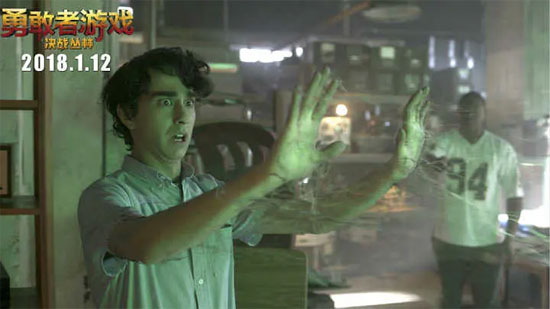
While tabletop games that emphasize face-to-face interaction and competition still have a dedicated following today, immersive experiences that pursue greater realism and deeper engagement represent the mainstream direction of gaming evolution—and the preferred subject matter for film adaptations.
Frankly, commercial entertainment films like “Jungle Battle” struggle to offer fresh twists in plot, scenes, or even special effects—and this film is no exception. Its real selling points and appeal lie in its star power and character contrasts.
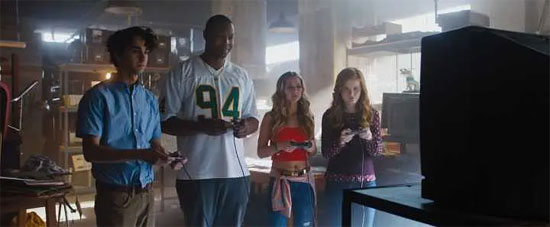
Spencer, the “prototypical nerd” who loves gaming and excels academically yet remains marginalized in real life; Fridge, the tall, athletic “sports star” with hopes of becoming a football team starter, yet a complete academic failure; Martha, the “cool girl” who despises P.E. class and everything else, wanting only to study; Bethany, the “campus goddess” who takes selfies all day, is adored by everyone, and is used to being the center of attention.
In the game, Spencer becomes Dr. Brave Stone, the absolute protagonist with maxed-out Strength and Agility talents; Fridge transforms into Finbar, a short but feisty zoologist and weapons expert; Martha evolves into Robbie, a sexy firecracker who can tear through burly men; and Bethany becomes Professor Oberon, the “chubby, nerdy old man” who deciphers maps.

See what I mean? All four main characters in the game have transformed into personas they could never be—or wouldn’t want to be—in real life.
The fringe characters became the main damage dealers, while the spotlight stars turned into support sidekicks… This “adorable incongruity” is amplified through the performances of Dwayne Johnson (the strongest sex symbol), Kevin Hart (a comedy and bad-boy regular), Karen Gillan (Nebula from Guardians of the Galaxy), and Jack Black (Hollywood’s resident comic relief).
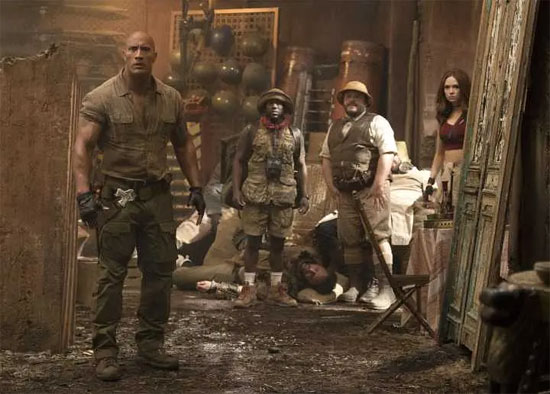
It’s safe to say that the bulk of Jungle Cruise’s fun and laughs stem from the four leads’ comedic mishaps as they struggle to adapt to their unexpected roles, alongside their gradual growth as they embrace their new personas. This formula is nothing new.
But “unoriginal” doesn’t equate to “unfunny.” Watching the invincible hulk cower in fear, the fiery beauty awkwardly imitate others, the Kung Fu Panda reveal his girly side, or the gloomy nerd spouting knowledge nuggets… it’s all entertaining.

Throughout the step-by-step game progression, the film seamlessly weaves in contemporary “family-friendly” elements—both new and old—that keep this otherwise unoriginal story from feeling dull or awkwardly funny. In other words, the pacing is spot-on, which is no small achievement.
Naturally, all the real-life issues and conflicts the characters face are resolved within the game.
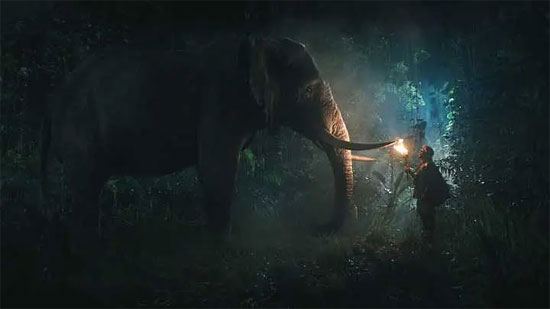
Under such a “logically consistent” plot setup, childhood friends Spencer and Fridge—once merely pretending to get along—progress from escalating conflicts to nearly severing ties, then venting all their pent-up resentment, until finally reconciling.
Spencer, who constantly feared “game over,” learned courage; impulsive and restless Fridge discovered the value of listening and understanding; insecure Martha took a step out of her shadow; and the pretentious and selfish Bethany became more likable through empathy and sacrifice.
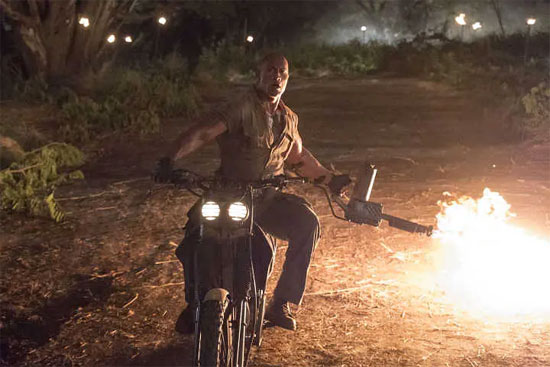
The film also features a design that pays homage to the original while introducing innovation: the four bring along Alex, who has been trapped in the game for 20 years. He transforms from an initial “pioneer” into a disheartened “loser,” only regaining his resolve through the encouragement of his successors, ultimately working together to complete the game.
Though Alex’s belief that he’d been “trapped for only a few months”—later debunked—subtly lessens the inherent tragedy, this “lighthearted” tone seems more fitting for the film’s style.

For a commercial film, achieving this level of “popcorn entertainment” is quite impressive—a testament to Hollywood’s formidable assembly-line production capabilities.
Now for a minor regret.
As everyone knows, the core theme of the Jumanji series is personal growth—a concept masterfully executed in the original film. Each of the four Jumanji players carried their own emotional baggage: Alan grappled with regret over childhood words spoken in haste and a deep-seated longing to return home; Sarah was haunted by fear and avoidance stemming from the mysterious disappearance of her childhood friend; while Judy and Pete struggled with grief, recklessness, and apathy born from the loss of their parents.

Not only did they gradually confront their inner selves through the game, learn from their mistakes, and become better versions of themselves, but they also altered the real-world bad ending after the game concluded. While delivering maximum entertainment, it also masterfully told a story of personal growth, adding a substantial layer of depth to an already solid film—this is the most crucial bonus for a commercial film beyond mere entertainment value.
From this perspective, “Welcome to the Jungle” delivers only a mediocre performance. While largely retaining the original film’s framework, its portrayal of character growth remains superficial, even skirting the deeper issues. The broader societal improvement is confined to Alex’s family, and the protagonists’ growth upon returning to reality feels more like scratching the surface…

To draw an analogy: “Jumanji” is like the classic popcorn flavor that once dominated the market—delicious and surprisingly nutritious. The newly launched “Welcome to the Jungle” variant has been tweaked for modern palates, offering enhanced flavor and texture that’s undeniably tasty, but at the cost of nutritional value.
So if you just want to unwind for a bit and satisfy your craving, the new popcorn is still a solid choice.
Please specify:Anime Phone Cases » Jumanji: Welcome to the Jungle 勇敢者遊戲:決戰叢林 2017 Film Review: Fresh and sweeter popcorn